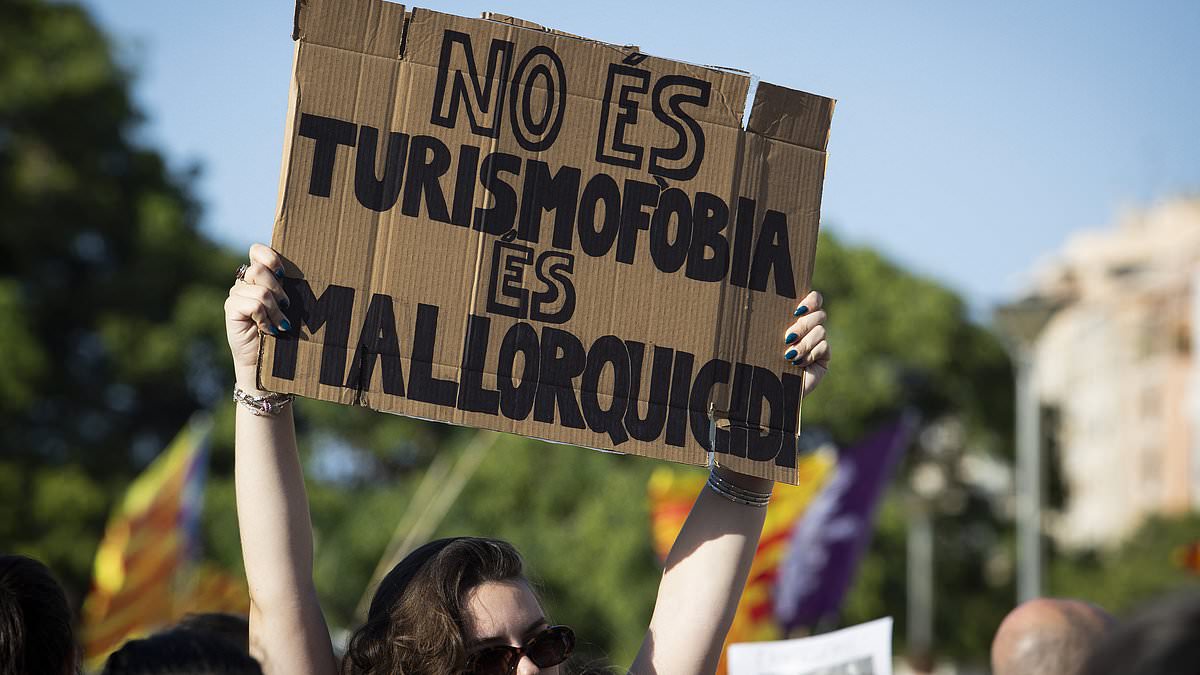Locals on a Balearic island have won the right to veto holiday rentals amid an anti-tourism row after a record number of visitors flocked to the British hotspot.
The local High Court ruled that residents in apartment blocks can now veto tourist rentals in their building in Majorca.
More than 60 per cent of residents would need to vote in favour of a tourist rental before it could be approved.
‘Community life is not designed to be shared with tourist activities that generate all kinds of problems and conflicts,’ Pablo Abascal, the president of the an organisation of property managers, told Ultima Hora.
This comes after new data showed that Majorca had seen a nearly five per cent increase in tourists during the first eight months of 2024.
Josep Marquet, the vice president of the same organisation, said he believes residents and tourists can coexist depending on the location.
He explained: ‘If it is done in Palma, with mostly working-class residents, it can be a great inconvenience for them. But in Pollenca [in northern Majorca], for example, where everything is second homes, it is not so bothersome.’
Holiday rentals in multi-family apartment buildings are currently only prohibited in Palma.
It comes as Majorca saw a 20 per cent fall in takings at its bars and restaurants despite a record number of visitors… after the number of Brits slumped following anti-tourism protests.
The number of Britons holidaying in the Balearic islands in July was 10 per cent lower than the month before, the Majorca Daily Bulletin reports.
Marches by anti-tourist activists have been taking place across Spain throughout the summer as locals accuse ‘low quality’ visitors of flocking to the country, with some singling out ‘drunk’ Britons.
When 50,000 Spaniards descended onto the streets of the Majorcan capital Palma on July 21, some protesters held up banners written in English saying: ‘Take back your drunks.’
But with Majorca’s drop in British tourists visiting the island also came a 20 per cent slump in the takings of bars and restaurants, which the Majorca Daily Bulletin says present a ‘worst case’ scenario for Majorcans.
The newspaper said locals hope for fewer tourists who spend more, rather than more tourists who spend less, which translates to less income for locals who rely on the tourism industry to keep them afloat.
In Spain – the world’s second most visited country – anti-tourist sentiment appears to have grown, particularly in the Balearic and Canary Islands. Of Spain’s 85 million tourists in 2023, 14.4 million and 13.9 million foreigners travelled to the Balearic and Canary Islands respectively.
The visitor figures are a stark contrast with the number of people who actually call the islands their home. According to 2019 figures, just 1.2 million people live across the Balearic Islands, and 2.2 million people live on the Canary Islands.
With locals feeling their way of life is coming increasingly under pressure, discontent has come to a head in several forms this year.
It comes as hundreds of bars and restaurants in Majorca are facing imminent closure following the worst season since Covid and tourists tightening their belts.
The warning has come from the restaurant association, PIMEM-Restauracion, which says their members are being strangled by three essential factors – the lack of qualified personnel, the increase in staff and activity costs, and a drop in sales.
Its president, Cesar Amable, says the increase in travel prices and accommodation has hit its sector and other mainstays of the complementary offer such as commerce this summer.
‘The average stay has been shortened and the budget of tourists has been limited, thus penalising the extraordinary expenses of the trip, a situation that has ended up confirming the least profitable season in recent years, a pandemic period aside,’ he said.
Restaurateurs are now demanding the creation of their own hospitality agreement that differentiates their conditions from those of hoteliers, as is already happening in other regions of Spain such as La Rioja, Madrid and Guipuzcoa at the provincial level.
The salary increases, they say, are unaffordable for a sector that this season has seen its turnover fall by around 20 per cent compared to last season.
Thus, they have explained that the collective agreement has increased staff expenses by 25.3 per cent since 2018, while the price of menus has risen by 10 per cent in the same period.
Majorca has also seen a 13 per cent decrease in the number of tourists from the Spanish mainland coming to the island.
The drop in British and Spanish tourists was however offset by an increased number of German visitors.
This comes after a summer of anti-tourism campaigns in Spain, with a member of the residents’ association of a Menorcan village dubbed the ‘Spanish Mykonos’ telling earlier this year: ‘We are not against tourism, we are just against uncivil people.’
Malaga directly addressed unruly behaviour from British tourists with a campaign this summer, warning visitors to dress appropriately and respect local customs.
The Spanish city has launched a campaign, complete with 17 billboards and numerous signs, aimed at curbing behaviours that have angered locals, especially during peak tourist season.
The signs, written in English and featuring the Union flag, directly address behaviours often attributed to British holidaymakers. Tourists are reminded they must follow municipal bylaws or face fines of up to €750 for violations.
The campaign, promoted by Malaga’s tourism department, highlights four major issues: inappropriate attire, littering, excessive noise and reckless e-scooter use.
